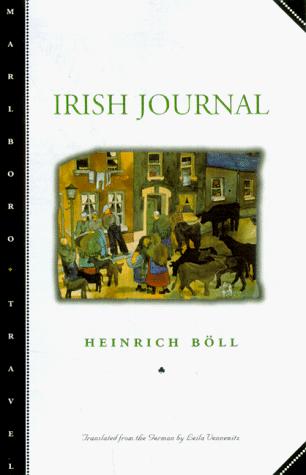127 páginas
Idioma English
Publicado el 15 de julio de 1998 por Marlboro Press.

127 páginas
Idioma English
Publicado el 15 de julio de 1998 por Marlboro Press.
Heinrich Böll’s Irish Journal constitutes a work of reflective prose that transcends the conventions of the travel narrative. Written in the 1950s, the text is structured not as a linear account but as a series of fragmentary impressions, forming a mosaic that captures both the material and spiritual dimensions of Ireland.
The author resists the tendency to depict Ireland as a picturesque destination. Instead, the portrayal emphasizes austerity, economic hardship, and social struggle, while at the same time acknowledging resilience, dignity, and moments of understated beauty. Böll’s observations avoid stereotypes, presenting the Irish people with sobriety and respect. His prose demonstrates a calm precision, elevating ordinary details—an inn, a modest meal, a rain-soaked street—into images of quiet significance.
The Irish Journal situates Ireland as a place defined by paradox: marked by deprivation and isolation, yet imbued with spiritual depth and cultural endurance. The emphasis on both hardship and …
Heinrich Böll’s Irish Journal constitutes a work of reflective prose that transcends the conventions of the travel narrative. Written in the 1950s, the text is structured not as a linear account but as a series of fragmentary impressions, forming a mosaic that captures both the material and spiritual dimensions of Ireland.
The author resists the tendency to depict Ireland as a picturesque destination. Instead, the portrayal emphasizes austerity, economic hardship, and social struggle, while at the same time acknowledging resilience, dignity, and moments of understated beauty. Böll’s observations avoid stereotypes, presenting the Irish people with sobriety and respect. His prose demonstrates a calm precision, elevating ordinary details—an inn, a modest meal, a rain-soaked street—into images of quiet significance.
The Irish Journal situates Ireland as a place defined by paradox: marked by deprivation and isolation, yet imbued with spiritual depth and cultural endurance. The emphasis on both hardship and vitality situates the work at the intersection of social commentary and literary meditation.
The text is distinguished by its formal restraint. It avoids sentimentality and romanticization, instead offering a lucid and measured testimony of place and people. Through this balance of austerity and attentiveness, Irish Journal becomes not only a portrait of a nation at a particular historical moment, but also an ethical reflection on survival, dignity, and the value of human endurance.